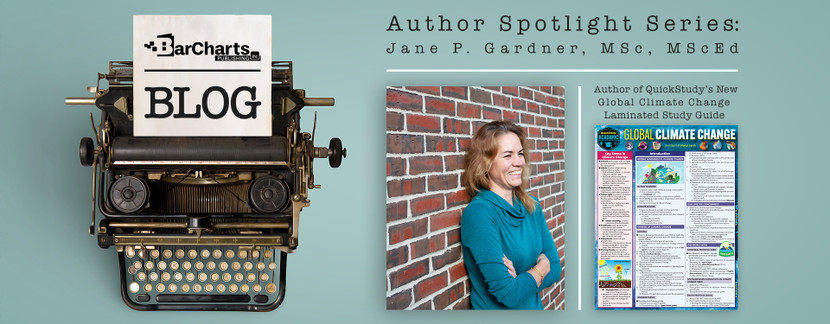Author Spotlight: Jane P. Gardner, MSc, MScEd
In this edition of our Author Spotlight Series, BarCharts Publishing is pleased to introduce to you, Jane Parks Gardner, MSc, MScEd.
With more than 50 nonfiction titles for K-12 and Higher Ed publication, Jane is the author of three QuickStudy laminated study guides: Chemistry 2, Physical Science, and Global Climate Change—which is the focus of our Author Spotlight Q&A. In addition to over two decades working in educational publishing, writing STEM curricula, authoring educational videos, and developing curriculum guides for school districts, educational organizations, and science centers, Jane has also taught at the high school level and currently serves as an undergraduate professor of Chemistry and Meteorology.
We are grateful for Jane’s dedication to her craft, and appreciate her time in offering some unique insight into her work:
1. What is your profession and what drew you to this career?
I always have trouble answering questions like this because there’s no simple answer. I went to college to study the Earth – I earned an undergraduate degree in Geology and focused my research on geochemistry in graduate school. I was doing exciting research but I grew to realize that what I really liked was talking about science. And learning new things. And writing. I’ve been fortunate enough to be able to combine all of those things into my career. This has, over the years, led me down many different paths, often at the same time. Now I get to teach, talk, and write about all sorts of science. It’s worked out very well for me.
2. What makes you the authority on the QuickStudy Global Climate Change guide you have written?
As a scientist, I have a natural curiosity and I think critically. These are attributes that have set me up well to author this Global Climate Change guide. I also have an in-depth understanding of the scientific concepts and cycles that underlie climate change. I have an open mind and I’m not afraid to challenge or be challenged by others. Climate change is an issue we all need to be aware of, and as an undergraduate professor and science writer, I get to bring the science and the idea of interconnectedness to my students and readers.
3. Finish this sentence: After using the QuickStudy guide Global Climate Change the reader will ______.
begin to question the world around them and their place in it (I hope). I hope my readers aren’t too pessimistic after reading this guide. Yes, there’s a lot to be concerned about here and it’s easy to think that things are truly bleak. But having an understanding of the science and the processes is powerful. My hope is that this guide will start discussions and stimulate thought on the issue of Earth’s changing climate and our role in that. My wish is that readers might find some hope for the future and be empowered to learn more about what they can do as individuals, to stem the negative consequences of human climate change.
4. The QuickStudy Global Climate Change Study Guide you have authored for BarCharts Publishing is loaded with valuable insight surrounding the general issues of climate change and the steps being taken to combat it by scientists and citizens alike. Beyond its direct emphasis on earth science, what other areas of scientific study do you feel are impacted most and why?
This is my favorite question! The study of climate change is so much more than Earth Science. It impacts the biosphere. Just look at the bleaching of the coral reefs as the pH of the ocean water changes. Or how rainforests may move from carbon sinks to carbon emitters as climate change alters that biome. Or how climate refugees in the Pacific Islands or central Africa are forced to migrate to support their communities. All living things are impacted. Climate change impacts meteorology and the study of weather. Patterns of global warming have changed the paths and intensities of hurricanes. Melting ice has changed the salinity of ocean water which impacts precipitation patterns. Our knowledge of oceanography has had to adapt to climate change. Geography, physical and cultural, have adapted and influenced climate change. Physicists work to create models of the energy balance on Earth, both in the past and for the future. We need to talk about climate change in every class and course. From practicing stoichiometry in chemistry by calculating the number of grams of carbon dioxide released into the atmosphere when 4.5 grams of butane is burned in a lighter to making the decision to buy local in-season produce as opposed to blueberries from far-flung regions of the world in the dead of winter to looking at the impact that the shrinking Lake Chad has on the economies of the surrounding citizens – it all can be looked at through a lens of climate change.
5. Given the detailed introduction on international climate treaties, in particular, the Paris Agreement established in 2015, do you believe progress is being made by the United States, despite its brief withdrawal, that will influence other major carbon contributors to stay the course?
I think we’ve already seen that, so yes, I do believe that. When the US withdrew, other countries, individual states, cities, and corporations stepped up. They committed to the foundation of the Paris Agreement, and in some cases, committed to reducing their greenhouse gas emissions by additional amounts to pick up the slack. Combating climate change is a global issue and falls at the hands of individual countries, states, cities, corporations, and individuals. I remain optimistic and hopeful that as a planet, we can work to change the trajectory we are on.
6. What do you hope will be the key takeaways from the Global Climate Change guide that will leave a lasting impression on everyone who uses it, whether for studying or referencing purposes?
It’s all connected! That’s what I hope my readers will take away from the Global Climate Change guide. It’s all connected. The different spheres that makeup Earth do not operate in isolation. Our actions affect the planet – the atmosphere, biosphere, hydrosphere – and our future.
Recent Posts
-
Nov 26th 2023
Become a QuickStudy
Becoming a quick study involves developing efficient learning strategies and adopting certain hab … -
Apr 14th 2023 | Posted by W. Ayers
Earth Day 2023 - Invest In Our Planet
A collective call to action spanning the four corners of the world for more than 50 years, Earth Day … -
Dec 2nd 2022 | Posted by A.Nasti
10 Life Lessons You Won't Learn In College
Teachers and textbooks can help you prepare for your career, but what about the life lessons they do …




